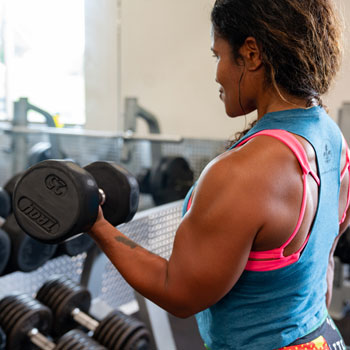Cutting Weight: What’s Healthy, What’s Not?

Find Your Perfect Match
Answer a few questions and we'll provide you with a list of primary care providers that best fit your needs.
Cutting weight has long been a practice for wrestlers and boxers. This term refers to rapid weight loss these athletes aim for when trying to compete in a certain weight class.
They may go to extreme measures to meet a certain weight. That’s because they want to compete against other athletes who are similar to them in size and strength. If they are a few pounds over a certain weight class, they may try to lose weight quickly right before a meet using methods that are unhealthy. This may include:
- Over-exercising
- Restricting calories
- Fasting
- Dehydration methods that cause a rapid loss of fluids. For instance, wearing multiple layers of heavy clothing, sauna suits, or garbage bags, to cause excessive sweating during exercise
Is Cutting Weight Dangerous?
 “The danger is that if you lose too much weight at one time, you could first be put into a smaller weight class, but you will be physically weaker since your body has been depleted of key nutrients, which is harmful to your body,” says Ashley Jewell, MS, AT, ATC, a Premier Health athletic trainer.
“The danger is that if you lose too much weight at one time, you could first be put into a smaller weight class, but you will be physically weaker since your body has been depleted of key nutrients, which is harmful to your body,” says Ashley Jewell, MS, AT, ATC, a Premier Health athletic trainer.
Losing weight quickly can have serious health consequences, which includes putting a significant strain on your cardiovascular system.
Other negative effects include:
- Dehydration, which decreases strength, endurance and mental alertness
- Muscle cramping
- Fatigue and/or insomnia
- Dizziness
- A decline in concentration and performance
- Death
Jewell adds, “Many wrestlers find themselves at risk for developing eating disorders as they become overly concerned about body image.”
Yet another downside: Rapid weight loss can destroy more lean muscle tissue than fat – the opposite result of what you may be aiming to achieve. That is, losing fat and maintaining muscle.
Losing weight quickly can have serious health consequences, which includes putting a significant strain on your cardiovascular system.
Healthier Ways To Lose And Maintain Weight
Jewell recommends, “Maintaining a correct diet that places the right nutrients into the body, along with exercise, is important.”
If you’re already at a healthy weight, weight loss is not likely to improve your performance. If you’re over your ideal, healthy weight, try these strategies:
- Work with your doctor, dietitian, or nutritionist on a weight loss plan and aim to lose one to two pounds per week. Slow weight loss is healthy. Most of the weight you lose this way will be from fat rather than muscle.
- Follow a healthy, balanced diet, and eat healthy every day. Do not fast.
- Get into a steady workout routine well before your sports season begins so your body has time to adapt.
- Avoid cycles of weight loss and gain.
It’s important to know that governing bodies, including the National Federation of State High School Associations (NFHS), have put into place strong guidelines around weight certification and weight loss for athletes in certain sports. The goals of these guidelines are to minimize weight loss fluctuations in athletes and help reduce unhealthy attempts at rapid weight loss.
Find Your Perfect Match
Answer a few questions and we'll provide you with a list of primary care providers that best fit your needs.
Sources: Children’s Hospital Colorado; HealthyChildren.org; American Academy of Pediatrics; Ashley Jewell, MS, AT, ATC, Premier Health Athletic Trainer





